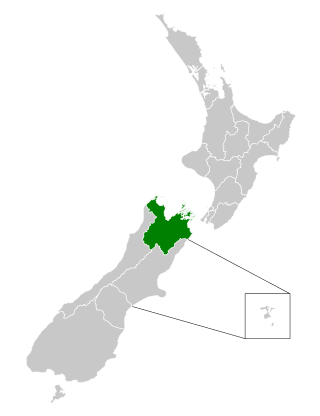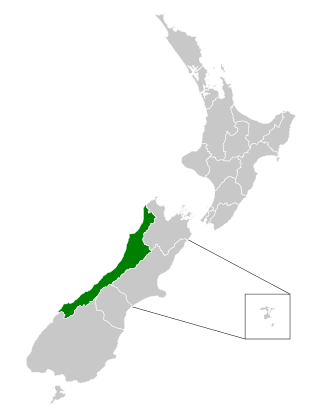
Waitakere Hospital is a general hospital located in the Henderson/Lincoln area of the New Zealand city of Auckland. It is administered by Te Whatu Ora and provides health services to residents in the North Shore, Waitakere and Rodney districts of Auckland. It has 76 medical beds and 6 coronary care beds, a maternity unit and a surgical unit with 3 operating theatres. The hospital's Emergency Department is open to both adult and paediatric patients 24 hours a day, seven days a week.

The Whanganui District Health Board was a district health board that provided healthcare to the Wanganui, Rangitikei, and parts of the Ruapehu districts of New Zealand. In July 2022, it was merged into the national health service Te Whatu Ora.

Auckland District Health Board (ADHB) was a district health board that provided healthcare in the Auckland Region in New Zealand, mainly on the Auckland isthmus. This district health board existed between 2001 and 2022 and was governed by a part-elected, part-appointed board. In 2022, its functions and responsibilities were subsumed by Te Whatu Ora and Te Aka Whai Ora.

The Counties Manukau District Health Board was a district health board which focused on providing healthcare to the Counties Manukau area in southern Auckland, New Zealand. As of 2016, it ws responsible for 534,750 residents; or 11% of New Zealand's population. In July 2022, CM Health was merged into the national health service Te Whatu Ora.

The South Canterbury District Health Board was a district health board with the focus on providing healthcare to the Timaru, Mackenzie, Waimate districts in New Zealand. In July 2022, it was merged into the national health service Te Whatu Ora.

The Canterbury District Health Board was a district health board with the focus on providing healthcare to the Canterbury region of New Zealand, north of the Rangitata River. It was responsible for roughly 579,000 residents, or 12% of New Zealand's population. The Canterbury District Health Board covered a territory of 26,881 square kilometers and was divided between six territorial local authorities. In July 2022, the Canterbury DHB was merged into the national health service Te Whatu Ora.

The Capital and Coast District Health Board (CCDHB) was a district health board with the focus on providing healthcare to Wellington City, Porirua City and the Kāpiti Coast in New Zealand. The CCDHB employed about 6000 people across the Wellington Region. It was disestablished on 1 July 2022, with its functions and responsibilities being taken over by the national health service Te Whatu Ora.

MidCentral District Health Board was a district health board that provided healthcare in the Manawatū region of New Zealand. The DHB covers the Manawatū District, Palmerston North City, Tararua District, Horowhenua District, and the Ōtaki ward of the Kāpiti Coast District. In July 2022, the MidCentral DHB was merged into the national health service Te Whatu Ora.

The Bay of Plenty District Health Board was a district health board with the focus on providing healthcare to the Bay of Plenty area of New Zealand. In 2022, the Bay of Plenty DHB was dissolved as part of a national overhaul of the district health board system. Its former functions and responsibilities were assumed by Te Whatu Ora.

The Hawke's Bay District Health Board was a district health board with the focus on providing healthcare to Hawke's Bay, New Zealand. In July 2022, it was merged into the national health service Te Whatu Ora.

The Hutt Valley District Health Board was a district health board that provided healthcare to the cities of Lower Hutt and Upper Hutt in New Zealand. In July 2022, the Hutt Valley DHB was merged into the national health service Te Whatu Ora.

The Lakes District Health Board was a district health board that provided healthcare to the area covered by Taupō and Rotorua districts in New Zealand. In July 2022, the Lakes DHB was merged into the national health service Te Whatu Ora.

The Nelson Marlborough District Health Board was a district health board with the focus on providing healthcare to the Nelson, Tasman and Marlborough districts of New Zealand. In July 2022, it was merged into the national health service Te Whatu Ora.

The Northland District Health Board is a district health board with the focus on providing healthcare to the Northland Region of New Zealand. In July 2022, the Northland DHB was merged into the national health service Te Whatu Ora.

The Southern District Health Board was a district health board which provided healthcare to an area covering the southern half of the South Island of New Zealand. In July 2022, the Southern DHB was dissolved as part of a nationwide overhaul of the district health board system. Its former functions and responsibilities were taken over by Te Whatu Ora.

The Tairāwhiti District Health Board, branded as Hauora Tairāwhiti since 2015, was a district health board with the focus on providing healthcare to the Gisborne District of New Zealand. In July 2022, the Tairāwhiti DHB was merged into the national health service Te Whatu Ora.

The Taranaki District Health Board was a district health board which provided healthcare to the Taranaki region of New Zealand. In July 2022, the Taranaki DHB was merged into the national health service Te Whatu Ora.

The Waikato District Health Board was a district health board that provided healthcare to the Waikato region of New Zealand.

The Wairarapa District Health Board was a district health board that provided healthcare to the Masterton, Carterton, and South Wairarapa districts of New Zealand. In July 2022, the Wairarapa DHB was merged into the national health service Te Whatu Ora.

The West Coast District Health Board was a district health board with the focus on providing healthcare to the West Coast region of New Zealand. In July 2022, the West Coast DHB's functions and responsibilities were taken over by the national health service Te Whatu Ora.




















